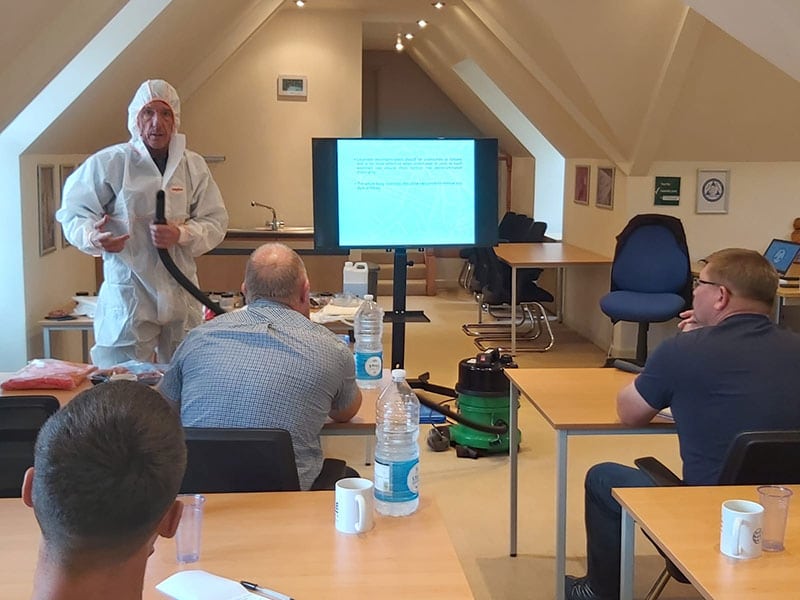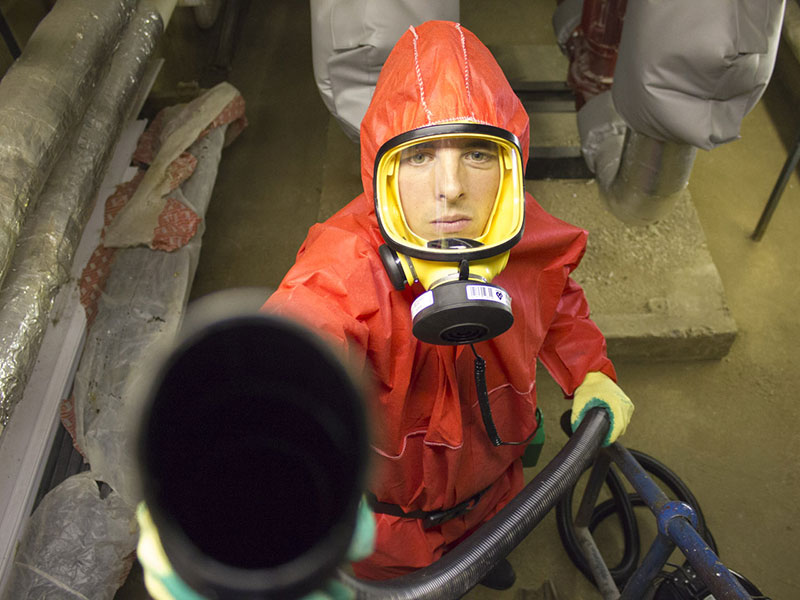The Complete Guide to Asbestos Training
There are a whole host of asbestos training courses available in the UK. These include many specialist modules for surveying, analytical, consultancy, and many more. However, the main three asbestos courses (known as Category A, B or C) that fit the asbestos training requirements of most people, are Asbestos Awareness Training, Asbestos Non-Licensed Training (for work with non-licensed asbestos materials) and Asbestos Licensed Training (for work with licensed asbestos materials).
Regulation 10 of the Control of Asbestos Regulations 2012 details the regulatory requirements for “Information, Instruction & Training.” In brief, the regulation requires adequate training for anyone liable to disturb asbestos during their work or those that supervise them. The training must enable them to safely and competently carry out their work without risk to themselves and others. These regulations are far-reaching and go beyond those employed within the asbestos industry.
There are still many people who do not realise that they need, and are legally required to, have and/or supply adequate asbestos training. The following sections give an overview of who is affected by this regulation and what asbestos training they may be required to have. Directors, supervisors, and managers are specifically required to have appropriate asbestos training under the regulations so they can carry out their roles correctly.
What is asbestos awareness training and who needs it?
Asbestos awareness training (or category A, Cat A asbestos training) is the most basic asbestos training. It’s designed as an introduction to asbestos and the potential risks it presents. An Asbestos awareness training course should be given to those who undertake work within or on any building or structure that may contain asbestos. That work, by its very nature, could disturb the fabric of the building. In addition, asbestos awareness training should be given to those who supervise, manage, or plan such works and anyone that fits the description given. However, some workers are more at risk from asbestos than others. In particular, workers involved in maintenance, refurbishment, demolition, and allied trades are significantly more at risk from asbestos. Those that must have asbestos awareness training include but are not limited to:
- Demolition workers
- Construction workers
- General maintenance staff
- Electricians
- Plumbers
- Gasfitters
- Painters & Decorators
- Joiners
- Shop Fitters
- Plasterers
- Roofers
- Heating & Ventilation Engineers
- Telecommunication Engineers
- Computer and Data Installers
- Fire & Burglar Alarm Installers
- Architects, Building Surveyors and Other Such Professionals
The only time that these types of workers would be exempt from the requirement to have asbestos awareness training is where it could be demonstrated that work would only be carried out on premises that are completely free of asbestos-containing materials. This information would need to be made available with suitable evidence under the duty to manage asbestos in regulation 4 of the current control of asbestos regulations.
What does asbestos awareness training include and how long does it take?
The time to deliver asbestos training will differ slightly by each course provider. If the course provider is accredited with UKATA (The United Kingdom Asbestos Training Association – as recommended by the HSE), then an asbestos awareness course typically takes four hours to deliver. In all cases, the duration of the asbestos awareness training should be appropriate for the type of training (initial asbestos awareness training or refresher asbestos awareness training), the role for which the person is being trained, and the nature of their work.
The asbestos awareness course is designed to give those sitting the course basic information on asbestos and the risks associated with asbestos. The asbestos awareness course should cover the following topics:
- The properties of asbestos.
- The effects on health from asbestos (Including the increased risk for those that smoke).
- The types used and likely occurrences of asbestos and asbestos containing materials (ACMS) in buildings and plants.
- The general emergency procedures to follow if asbestos is accidentally disturbed and asbestos dust or fibre is released.
- How to avoid the risks from asbestos, e.g., for building work, no one should carry out work which disturbs the fabric of a building unless it has been confirmed that asbestos-containing-materials are not present.
If work is planned which is liable to disturb asbestos-containing materials, then additional training above and beyond asbestos awareness training will be required and should be appropriate to the work being done.
How often should asbestos awareness training be carried out?
Although there is no legal requirement for a formal refresher course on asbestos awareness every 12 months, there is a requirement to provide an adequate asbestos awareness update every 12 months. This update must be delivered by a person competent to do so, as such, most organisations opt for a formal asbestos awareness refresher every 12 months to comply with the regulatory requirement.
The asbestos awareness refresher or update should be a realistic, common-sense approach to refreshing knowledge and skills based on judgement of an individual’s abilities and training needs. An asbestos awareness refresher or update typically takes an hour to deliver.
What is asbestos non-licensed training and who needs it?
Non-licensed asbestos training (or category B, Cat B asbestos training) is for anyone involved in working with non-licensed asbestos work. Within the control of asbestos regulations, work with asbestos is generally divided into two categories and applies to the type of asbestos material being worked on. These two categories are non-licensed asbestos (and work) and licensed asbestos (and work). Work with licensed asbestos materials generally requires notification to the HSE 14 days prior to carrying out any such work.
There are circumstances where work on licensed asbestos materials is considered to be a lower risk and therefore does not require notification to the HSE. These non-notifiable works are called Non-Notifiable Licensed Works (NNLW). Non-licensed asbestos training includes the required training to undertake works considered non-licensed asbestos works and NNLW.
For those undertaking non-licensed asbestos work and NNLW non-licensed asbestos training is required. This non-licensed asbestos training is in addition to asbestos awareness that must also form part of the training.
For employers who have employees undertaking non-licensed asbestos work, the procedures for providing training must be clearly defined and referred to within a written health and safety policy document. Records must be kept of each individual’s training. Employers must also ensure the following information is in place and available:
- Plan of work and risk assessments for any asbestos work
- Details of any air monitoring results where applicable
- Maintenance records for control measures
- Personal information and health records of employees
- Records of face fit tests and respiratory protective equipment
- Records of individuals training for work with asbestos
What does non-licensed asbestos training include and how long does it take?
The time to deliver this asbestos training will differ slightly by each course provider. If the course provider is accredited with UKATA (The United Kingdom Asbestos Training Association – as recommended by the HSE), then an asbestos non-licensed asbestos course typically takes eight hours to deliver with the first four hours being general asbestos awareness. In all cases, the duration of the asbestos training should be appropriate for the type of training (initial asbestos training or refresher asbestos training), the role for which the person is being trained, and the nature of their work.
The asbestos non-licensed training course is designed for those that will be involved in working with non-licensed asbestos. The non-licensed asbestos training course should include:
- The operations which could result in asbestos exposure and the importance of control measures
- The control limit and the importance of air monitoring
- Safe work practices, control measures and protective equipment
- Correct use and maintenance of control measures, including where needed erection and maintenance of asbestos work enclosures
- Procedures for recording, reporting and correcting defects
- The purpose, selection and limitations of RPE
- The correct use, cleaning, maintenance, and storage of RPE and PPE
- Hygiene requirements when working with asbestos
- Requirements and procedures for medical examination
- Decontamination procedures
- Waste handling procedures
- Work which requires a notification and work which is NNLW
- Introduction to relevant regulations, ACOPS and guidance notes
- Personal sampling and techniques for analysts
- Other hazards such as working at height or in confined space
- Practical training on decontamination, PPE, RPE, enclosure construction and the use of control measures such as H type vacuums
Employers are required to carry out ongoing training needs analysis for all employees involved in undertaking non-licensed asbestos work and NNLW.
How often should asbestos non-licensed training be carried out?
There is a legal requirement to undertake refresher training for non-licensed asbestos work every 12 months. This should be undertaken more frequently if the individuals training needs analysis highlights it and where work methods change, equipment used changes or the type of work being carried out significantly changes.
What is asbestos licensed training and who needs it?
Asbestos licensed training (or category C, Cat C asbestos training) is for anyone carrying out licensed asbestos work. For employers who are having employees undertaking licensed asbestos work, the procedures for providing training must be clearly defined and referred to within a written health and safety policy document. Records must be kept of each individual’s training. Employers must also ensure the following information is in place and available:
- Plan of work and risk assessments for any asbestos work
- Details of any air monitoring results where applicable
- Maintenance records for control measures
- Personal information and health records of employees
- Records of face fit tests and respiratory protective equipment
- Records of individuals training for work with asbestos
What does licensed asbestos training include and how long does it take?
The time to deliver this asbestos training will differ slightly by each course provider. If the course provider is accredited with UKATA (The United Kingdom Asbestos Training Association – as recommended by the HSE), then an asbestos licensed asbestos course for a basic operative or supervisor typically takes three days to deliver. In all cases, the duration of the asbestos training should be appropriate for the type of training (initial asbestos training or refresher asbestos training), the role for which the person is being trained, and the nature of their work.
The asbestos licensed training course is designed for those that will be involved in working with licensed asbestos. The licensed asbestos course is in-depth and contains a large number of modules. HSG247 Asbestos: The Licensed Contractors Guide sets out the full detail of each and every module required for licensed training. As a guide, the following elements should be included in asbestos licensed training in addition to those noted for non-licensed asbestos training and asbestos awareness training:
- Detailed construction of work enclosure including air management
- Decontamination procedures within airlocks, enclosures, and decontamination units
- Site set up including barriers, transit routes, waste storage areas, pre-cleaning etc.
- Controlled removal techniques and how they work, including types of wet surfactants, injection etc.
In addition, the licensed asbestos training will include the requirements for four-stage clearance testing and smoke testing for enclosures. For managers and directors, there will be additional training that will incorporate the correct procedures for notification to the HSE, standard operating procedures, emergency procedures, asbestos policy documents as well as all other elements required by the regulations to carry out work with licensed asbestos materials.
How often should asbestos non-licensed training be carried out?
There is a legal requirement to undertake refresher training for licensed asbestos work every 12 months. This should be undertaken more frequently if the individuals training needs analysis highlights it and where work methods change, equipment used changes or the type of work being carried out significantly changes.
How can Oracle help me with asbestos training?
Oracle provides a full asbestos training service. As a UKATA certified asbestos training provider, we can deliver all your asbestos training needs. Speak to a member of the Oracle team for more information.
In addition to our asbestos training services Oracle also provide the following:
For more information and to book your asbestos awareness training contact a member of the team now or call 0844 800 0801.

Written by Jess Scott
Jess Scott has been an all-round asbestos consultant since 1996. That’s nearly 3 decades of asbestos knowledge. He spends his time sharing that knowledge with the team at Oracle and with their clients. Jess's goal is, and always has been, to use my expertise in helping people to comply with the law. This legal compliance ultimately helps to protect everyone from the harmful effects of asbestos. Jess has acted as an asbestos expert witness in legal cases and is involved in many asbestos educational activities throughout the UK.



